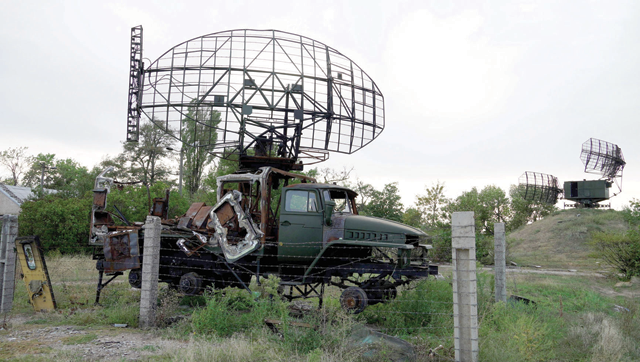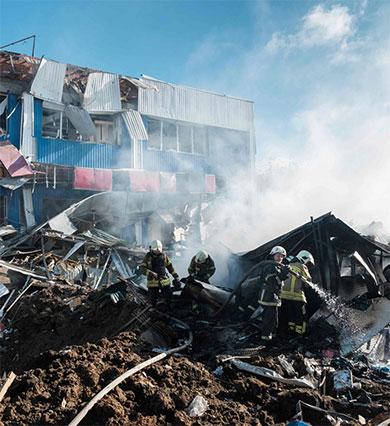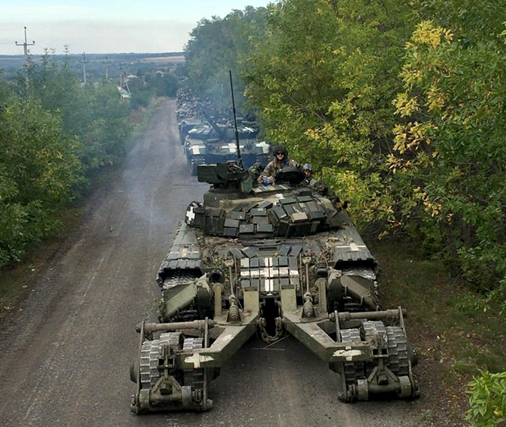You are here
Russia strikes Kharkiv ahead of Erdogan, UN chief meeting with Zelensky
By AFP - Aug 18,2022 - Last updated at Aug 18,2022

Elderly people rest in the basement they live in due to constant shelling in Avdiivka, Donetsk region, on Thursday, amid the Russian military invasion of Ukraine (AFP photo)
KYIV, Ukraine — Russian strikes battered the northeast Ukraine region of Kharkiv on Thursday, killing at least five people, hours ahead of the first face-to-face meeting since the start of the war between the Turkish and Ukrainian leaders.
Moscow, meanwhile, denied it had deployed any heavy weapons at the Russian-controlled Zaporizhzhia nuclear power plant in southern Ukraine where a recent escalation in fighting has increased fears of a nuclear disaster.
The head of the Kharkiv region Oleg Synegubov said Moscow's forces had launched eight missiles from Russian territory at around 04:30 local time (01:30 GMT) striking across the city.
"Three people died, including a child. Eight people, including two children, were rescued," the emergency services said.
Synegubov posted images from the scene of one strike showing the smouldering remains of several burnt out buildings and twisted wreckage of destroyed vehicles nearby.
In separate strikes on the town of Krasnograd southwest of Kharkiv, bombardments that damaged residential buildings left two dead and two more injured, he said.
"Kharkiv. 175 days of horror. Daily terror, missile strikes on residential areas and civilians," a senior presidential aide, Mykhaylo Podolyak, wrote on social media.
The strikes in the war-scarred east of the country come a day after bombardments killed at least seven in the city and as the Turkish President Recep Tayyip Erdogan and UN chief Antonio Guterres were convening in the western city of Lviv.
The two were key brokers of a deal last month with Moscow and Kyiv allowing the resumption of grain exports from Ukraine after Russia's invasion blocked essential global supplies.
A spokesman for Guterres said that the UN chief, Ukrainian President Volodymyr Zelensky and Erdogan will discuss the grain deal, as well as “the need for a political solution to this conflict”.
He added that he had “no doubt that the issue of the nuclear power plant” would be raised.
In his regular nightly address on Wednesday, Zelensky said he and Guterres would “work to get the necessary results for Ukraine”.
The UN chief is slated to travel on Friday to Odessa, one of three ports involved in the grain exports deal — hammered out in July under the aegis of the UN with Ankara’s mediation.
He will then head to Turkey to visit the Joint Coordination Centre, the body tasked with overseeing the accord.
According to the UN, the first half of August saw 21 freighters authorised to sail under the deal carrying more than 563,000 tonnes of agricultural products, including more than 451,000 tonnes of corn.
The first wartime shipment of UN food aid for Africa reached the Bosphorus Strait on Wednesday carrying 23,000 tonnes of wheat.
Russia’s defence ministry meanwhile said Thursday its forces had not deployed heavy weapons at the Zaporizhzhia plant, accusing Kyiv of preparing a “provocation” at the station.
“Russian troops have no heavy weapons either on the territory of the station or in areas around it. There are only guard units,” the ministry said in a statement.
Zelensky touched on the Zaporizhzhia plant in his address on Wednesday, saying Ukrainian diplomats and scientists were in “constant touch” with the International Atomic Energy Agency (IAEA) with the goal of sending a mission by the watchdog to the occupied nuclear facility.
“The Russian army must withdraw from the territory of the nuclear power plant and all neighbouring areas, and take away its military equipment from the plant,” he added. “This must happen without any conditions and as soon as possible.”
Earlier Wednesday, NATO Secretary General Jens Stoltenberg said Russia’s seizure of the plant “poses a serious threat to the safety and the security of this facility [and] raises the risks of a nuclear accident or incident”.
Also calling for a Russian withdrawal and inspections by the IAEA, Stoltenberg accused Moscow of using “the ground around the nuclear power plant as a staging area, as a platform, to launch artillery attacks on Ukrainian forces, and this is reckless”.
Russian forces took the Zaporizhzhia plant, located in southern Ukraine, in March shortly after invading.
It is the largest in Europe, and the uncertainty surrounding it has fuelled fears of a nuclear accident to rival Chernobyl in 1986.
Russia and Ukraine have accused each other of shelling the Zaporizhzhia installation.
Related Articles
KHARKIV, Ukraine — Russia said it was pulling back troops from the eastern Kharkiv region of Ukraine as Kyiv announced massive territorial g
KYIV — The United States on Wednesday promised to send more precision rocket systems to Kyiv, soon after Moscow signaled it was aiming to se
KRAMATORSK, Ukraine — Ukraine forces said Monday their lightning counteroffensive took back more ground in the past 24 hours, as Russia repl



















